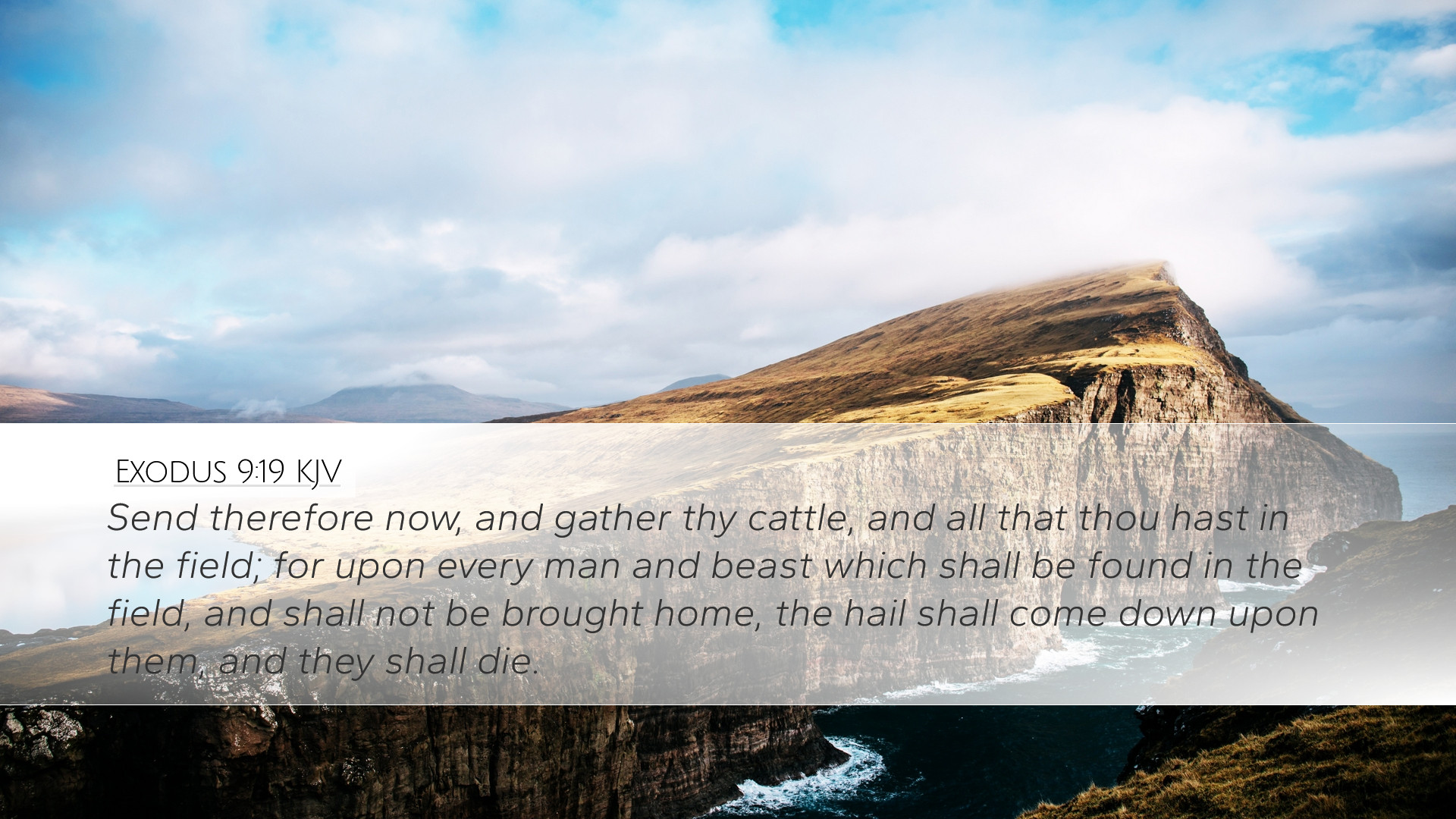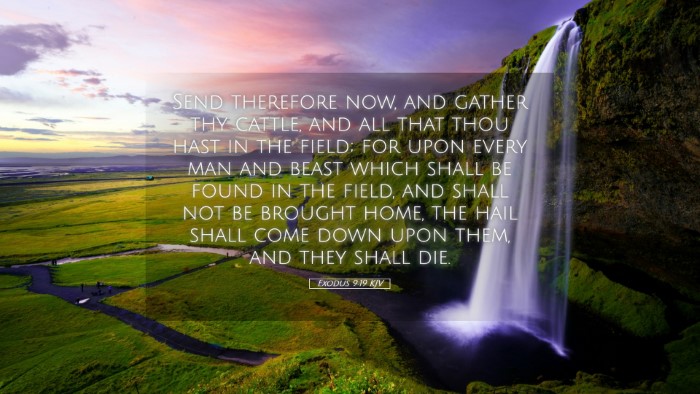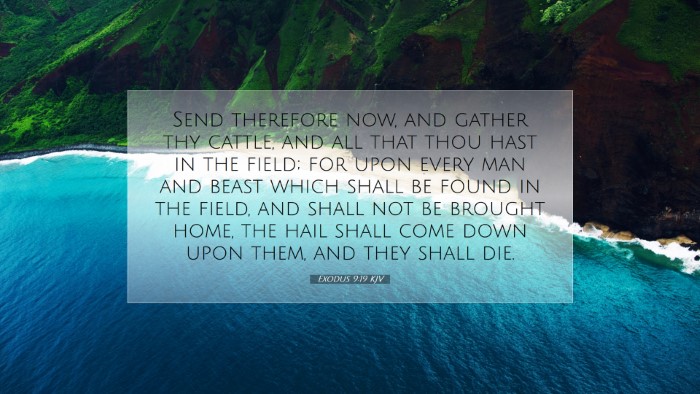Commentary on Exodus 9:19
Verse: Exodus 9:19 – “Therefore send now and gather your livestock and all that you have in the field, for the hail shall come down on every man and every animal which is found in the field and is not brought home; and they shall die.”
Introduction
The book of Exodus recounts the Israelites' deliverance from Egyptian bondage and climaxes at the giving of the Law. Chapter 9 records the plagues that were instrumental in demonstrating God's sovereignty over Egypt and its gods. Specifically, verse 19 serves as a poignant reminder of the impending destruction due to the plague of hail, illustrating God's mercy amidst judgment and the urgent need for obedience.
Commentary Insights
Matthew Henry’s Commentary
Matthew Henry highlights the significance of this command as an act of divine mercy. He notes that despite the severity of the punishment to come, God provides a means of refuge for both humans and animals. This divine forewarning reflects God's compassion even in judgment.
Henry points out that the command to gather the livestock emphasizes the importance of preparedness. The distinction made between those who heed God’s warning and those who do not showcases the broader spiritual principle of obedience to divine instruction as a means of preservation.
Albert Barnes’ Notes on the Bible
Albert Barnes elaborates on the command’s urgency, underlining the necessity for immediate action. The impending hail is described as a forceful and destructive agent, capable of wiping out unprotected life. Barnes asserts that this moment underscores God's authority over nature and nations, compelling both Egypt's monarchs and its populace to acknowledge His sovereignty.
Furthermore, Barnes reflects on the implications of God’s warnings. The necessity to gather one’s possessions serves as a metaphor for spiritual preparedness; it is not merely a physical gathering but a call to gather one's heart unto obedience. The immediate response serves as an act of faith acknowledging God’s word as true.
Adam Clarke’s Commentary
Adam Clarke offers an expository take on the severity of the impending hailstorm, emphasizing the destructive nature of this plague as a divine retribution against Pharaoh’s hard-heartedness and persistent refusal to release the Israelites. Clarke notes that such judgements serve a dual purpose: they evoke fear and lead to eventual repentance.
Clarke also addresses the theological implications of the warning: it is as though God is inviting Pharaoh and the Egyptian people to recognize that their obstinacy has consequences. This verse reflects a profound truth—while judgment is certain, God continuously stretches out grace, giving opportunity for repentance and refuge.
Theological Implications
The call to gather one’s livestock and possessions can be interpreted in light of larger theological themes throughout Scripture. As both Matthew Henry and Albert Barnes note, the principle of obedience in response to divine warning is pivotal. Failure to heed God's instruction not only has physical consequences, as illustrated by the impending hail, but also spiritual ramifications.
In the New Testament context, similar warnings are found, notably in Jesus’ teachings. The urgency to be prepared for divine judgment is reflected in parables (e.g., the Parable of the Ten Virgins, Matthew 25:1-13), indicating an ongoing theme of vigilance and readiness in the believers' lives.
Practical Applications for Today
For contemporary readers, especially pastors and theologians, Exodus 9:19 serves as a stark reminder of the call to be responsive to God's leading. There are several meaningful applications and reflections:
- Obedience to Divine Warnings: Emphasizing the necessity to heed God's words, whether through Scripture, sermons, or the promptings of the Holy Spirit.
- Readiness for God’s Judgment: Encouraging the faithful to live with urgency and in a state of readiness for Christ's return, reminiscent of the urgency expressed in this verse.
- God’s Mercy in Judgment: Highlighting the balance between God’s justice and mercy. God provides a way of escape, showing that He desires all to come to repentance (2 Peter 3:9).
- Spiritual Preservation: Drawing parallels with spiritual preparation, emphasizing that gathering one's 'tools' for service—faith, prayer, and community—is critical in the face of impending trials or crises.
Conclusion
Exodus 9:19 holds a significant place in the narrative of God’s interactions with Pharaoh, showcasing both His authority and His mercy. By synthesizing insights from Matthew Henry, Albert Barnes, and Adam Clarke, this commentary reveals the depths of meaning behind the directive given to the Egyptians. It serves as an admonition that resonates with all readers, compelling a response of repentance, readiness, and reverent obedience to the God who desires none to perish.


